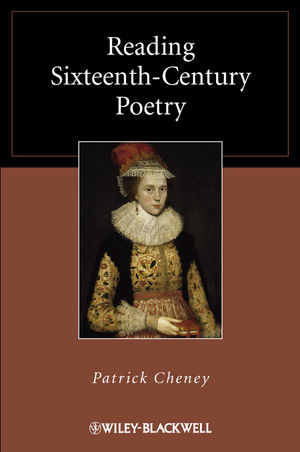Reading Sixteenth-Century PoetryISBN: 978-1-4051-6954-7
Hardcover
352 pages
May 2011, Wiley-Blackwell
 |
||||||
“Highly useful in addressing the formal and generic
concerns of sixteenth-century poets, and thus in demonstrating
close reading, Reading Sixteenth-Century
Poetry fails to address the equally important political
and theoretical period discourses or the methodologies needed to
address them. The unbalanced infatuation with authorial vocation
and authorial perspectives thus limits the usefulness of the text.
Cheney’s companion text may thus represent a more widespread
return to traditional author-centered interpretive theories and
a
turn away from poststructural approaches.” (Journal
of the Northern Renaissance, 1 December 2012)
"A carefully selected bibliography that focuses on background sources as well as on primary works and significant critical material is a valuable supplement to the author's consideration of the poetry. Cheney develops his thesis clearly and makes an important contribution to Renaissance scholarship. Recommended. Upper-division undergraduates through faculty." (Choice, 1 October 2011)
"Patrick Cheney's "Reading Sixteenth Century Poetry" provides a new and indispensible map of English poetry together with its voices, career structures, influences and historical contexts. Cheney's cohesive account challenges the standard narrative about the development of poetry in England and does so through dazzling readings of the verse. The volume's well-paced, lucid prose style also succeeds in making it accessible to undergraduates even as it provides fresh and important insights for scholars. Everybody should teach this book."—Dympna Callaghan, Syracuse University
"Patrick Cheney's Reading Sixteenth-Century Poetry is
remarkable. Not only does it constitute a masterful and eminently
readable introduction to some of the greatest poetry in the English
language, but it also provides a set of enabling tools with which
this poetry is best approached. Providing close analysis and the
broad picture, paying attention to text as well as context, Cheney
is a compelling guide to how to read sixteenth-century poetry. I
cannot imagine a student who will not greatly benefit from this
study."
—Lukas Erne, University of Geneva



